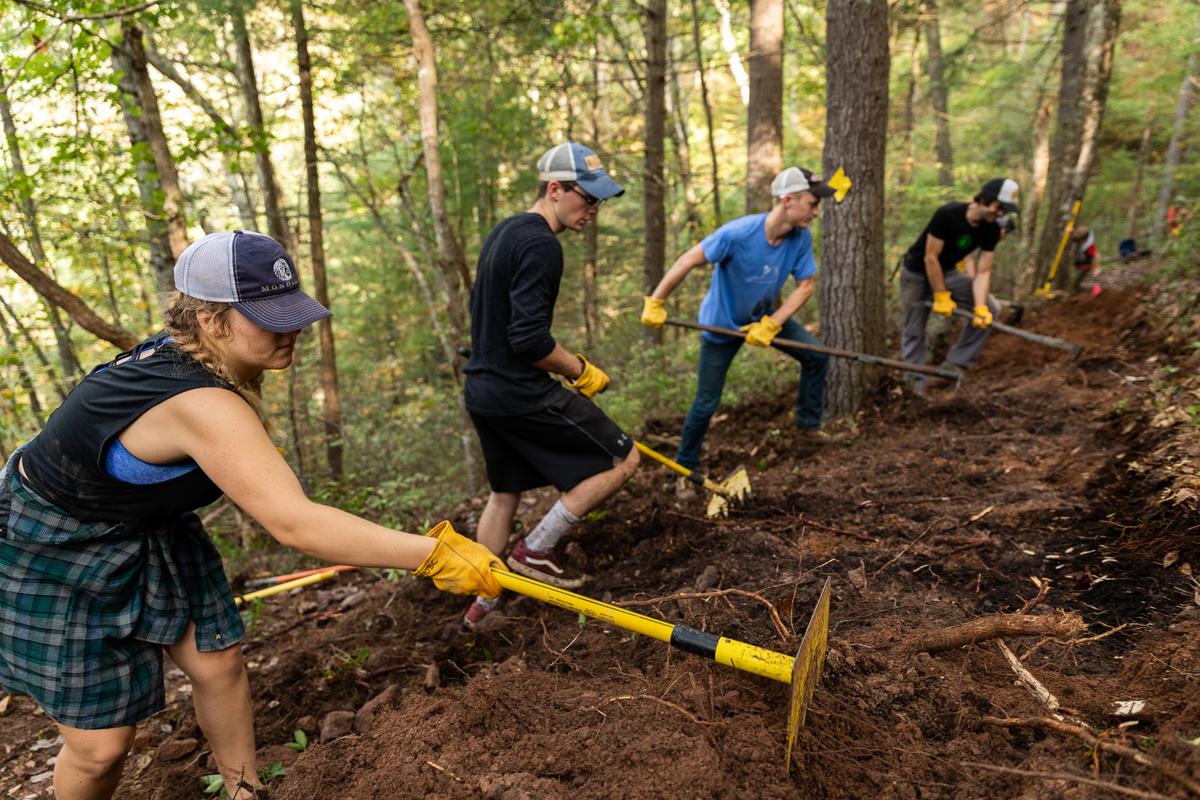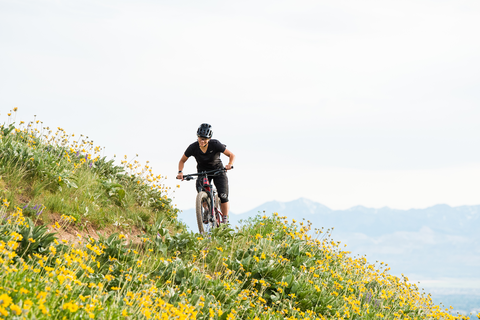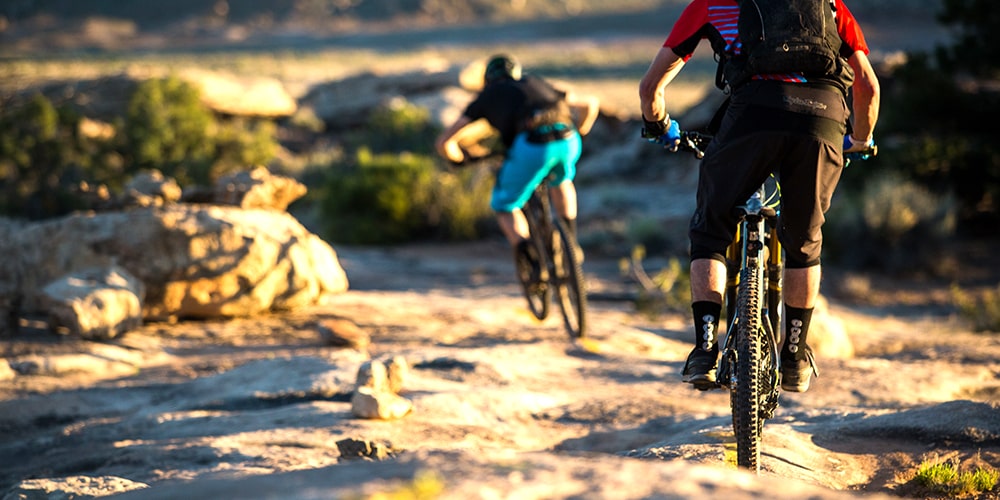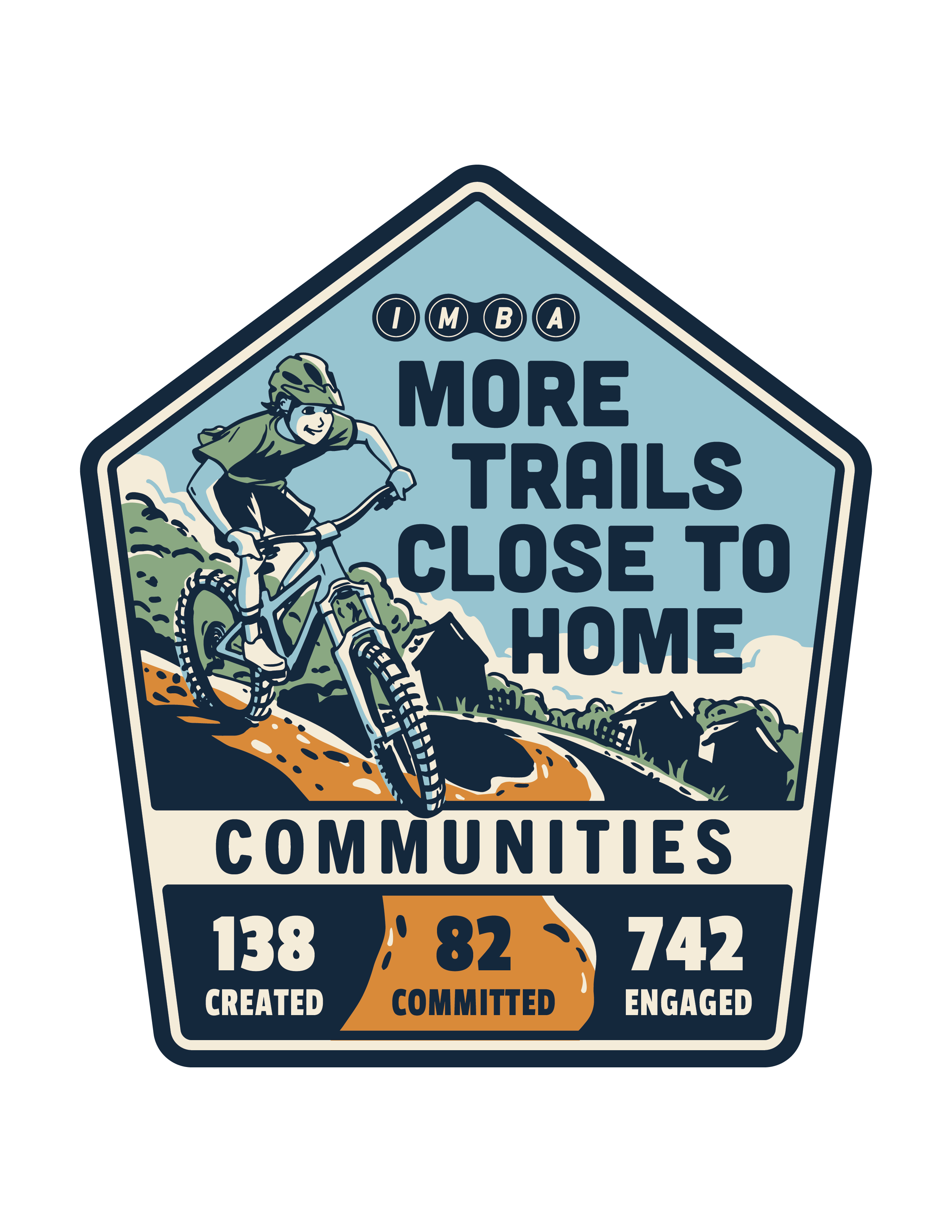Lifeline, Shoreline Film Advocates to Complete Utah’s Bonneville Shoreline Trail
Media contact: Eleanor Blick
IMBA Director of Communications
(720) 900-4622
(BOULDER, Colo., Feb. 15, 2023) — The new Legacy Trails Grant Program awarded a total $1.35 million to 33 projects aimed at restoring, protecting, and maintaining watersheds on National Forest lands. Eighteen of the recipients are projects benefiting mountain biking trails. These mountain biking projects received a total of $581,087 in funding from the program, which local organizations have prepared to match through additional fundraising. The 18 projects are expected to address 170 miles of deferred maintenance, 208 miles of trail construction and improvement, and will build and repair 21 bridges and 46 culverts, all through the help of nearly 2,000 volunteers who will dedicate an estimated 31,809 volunteer hours to trails.
“The Legacy Trails Grant Program is a great display of how trails and recreation aid in conservation,” said David Wiens, International Mountain Bicycling Association (IMBA) Executive Director. “Not only do these projects have great components for mountain biking and for all trail users, but every project takes strong strides to protect and steward the surrounding environment, for its intrinsic value and so communities can cherish the great outdoors.”
Mountain biking is an environmentally low-impact activity that aids in protecting and enjoying open space, and IMBA promotes sustainable trails to minimize impacts on the environment, natural resources, and wildlife.
Summaries are below for this year’s 18 awarded projects that benefit mountain biking in Alaska, Arkansas, California, Colorado, Idaho, Minnesota, Montana, North Carolina, Oregon, Pennsylvania, Virginia, Washington and Wyoming.
This pilot grant is available through the Bipartisan Infrastructure Law passed in November 2021, one of many funding opportunities for recreation and conservation that the outdoor community has successfully advocated for throughout the past several years. The Legacy Trails Grant enables IMBA Local Partners and other non-profit organizations to complete trail projects which improve watershed health, restore aquatic organism passages, preserve trail access, and/or decommission unauthorized and previously closed trails through restoration. Projects can include NEPA planning, trail clearing, brushing, tread repair, trail relocation, bridge and structure repair or replacement, and installation of trail signs provided they contribute to the goals of the Bipartisan Infrastructure Law.
IMBA encourages IMBA Local Partners and other trails organizations to review the program and consider potential project eligibility prior to the 2023 application cycle.
American Trails is the lead manager for this program, working collaboratively with IMBA and other trail groups to review and select projects that will provide an overall benefit to the National Forest System lands and trails network. Collaborating groups on the application review team include the National Wilderness Stewardship Alliance, the American Hiking Society, the Back Country Horsemen of America, the National Off-Highway Vehicle Conservation Council, Tread Lightly, and the American Motorcyclist Association.
2023 GRANT RECIPIENTS BENEFITING MOUNTAIN BIKING TRAILS:
Chugach National Forest, Alaska
Partners: American Hiking Society
Project: The Lost Lake Trail project consists of rebuilding a step-and-run structure to reduce erosion and provide a durable surface when the nearby swamp is full of water. Additional trail maintenance will also be completed.
Trails: Lost Lake Trail and a portion of the Iditarod National Historic Trail
St. Francis National Forest, Arkansas
Partners: Arkansas Department of Parks, Heritage and Tourism – State Parks Division
Project: The Storm Creek Connector Trail will connect Storm Creek Campground and Storm Creek Day-Use Area via an authorized trail designed by Arkansas State Parks. The goal of the project is to convert an old National Forest Service road and several unauthorized user-created trails into one authorized, well-designed, and properly signed trail that connects the two areas. This project will introduce trails and trail advocacy to an historically underrepresented population and likely can be a catalyst for additional trail development for hiking, trail running and mountain biking in this area.
Trails: Storm Creek Connector Trail
Inyo National Forest, California
Partners: Friends of the Inyo, June Lake Trails Committee, Mono County, the Inyo National Forest, and DeChambeau Creek Foundation
Project: The Twenty Lakes Basin Roads and Trails enhancement project proposes to restore more than three miles of unauthorized use trails that damage wet, alpine meadow habitat, and address deferred maintenance on nearly ten miles of heavily used system trails in the popular Hoover Wilderness of the Inyo National Forest. By restoring erosive, undesignated, user-created trails through sensitive meadow habitat and enhancing existing system trails, the project reduces the ecological impact of the designated trail system and improves user experience. User-trail restoration will directly enhance meadow and watershed function to benefit documented breeding populations of federally threatened Yosemite Toad, as well as enhance one of Mono County’s most popular and easily accessible backcountry angling destinations sporting four species of trout. The project will benefit three public water systems, as well as a major hydroelectric generation reservoir.
Trails: Saddlebag Lake Trail
Los Padres National Forest, California
Partners: Sage Trail Alliance, Santa Ynez Band of Chumash, Boy Scouts, U.S. Forest Service, additional local volunteer groups
Project: The Buckhorn and Indian Trails within the Santa Barbara Ranger District of the Los Padres National forest make up 8 miles of singletrack trail that follow a creek drainage from the upper Santa Ynez River to the headwaters of Little Pine Mountain. The once-IMBA EPIC trail and ecosystem have experienced multiple natural disasters including forest fire and debris flows, rendering the trail unusable for nearly two decades. This project is a shining example of restoring American trail legacy with the intent to restore watersheds on public lands. Mountain bikers are coordinating with conservationists on Wilderness access, partnering with Tribal Communities to protect heritage, and working on federal legislation to preserve the region. When completed, this trail will tie into a greater network of trails to complete a 40-mile backcountry network.
Trails: Buckhorn Trail
Los Padres National Forest, California
Partners: Los Padres Forest Association
Project: As a National Recreation Trail, the Santa Cruz Trail should be the pinnacle of what the National Forest Trail System has to offer the public. Unfortunately, due to the destructive 2016 Rey Fire, the Santa Cruz Trail is in disrepair. This project will restore the southern 5.4 miles of the popular and beloved Santa Cruz Trail to provide centrally located trail access for mountain bikers, hikers, and equestrians. This project, through erosion control and restored access, will also provide long-lasting protection for the endangered Southwestern Arroyo Toad and California Red-legged Frog, as well as watershed protection for Santa Barbara County citizens.
Trails: Santa Cruz Trail
Tahoe National Forest, California
Partners: Western States Trail Foundation, Western States Endurance Run, U.S. Forest Service
Project: A primary goal of this project is to reduce frequency of maintenance needs while providing public access and safety. Work will improve a section of trail on the National Register of Historic Places within the Tahoe National Forest trail system along the Western States trail. This special area has major cultural and heritage resources, threatened and endangered species, natural resources, and native plant communities. It is in need of extensive repair due to rapid water runoff, flooding, debris flows, rockfall and increased erosion, all exacerbated by damage from the 2022 Mosquito Fire.
Trails: Western States - Deadwood to El Dorado Canyon
Medicine Bow - Routt National Forest, Colorado
Partners: Routt County Riders
Project: The Soda Ditch Loop Trail is a popular connector and loop-access route based out of the busy Dry Lake Campground and parking area vicinity of Buffalo Pass. For cyclists, it is often used on the return from the further-flung Soda Mountain Trail or Grouse, both expert-level backcountry experiences for riders and other trail users. There are several low points in the trail that have become eroded, muddy, and dangerous to trail users as they widen the tread trying to “go around” the wet spots. The aim of this project is to reduce negative impacts to water quality and sensitive soils by constructing simple timber bridges over the wet and eroded sections.
Trails: Soda Ditch Loop 1020.1
Caribou Targhee National Forest, Idaho
Partners: Mountain Bike the Tetons
Project: The Horseshoe Canyon trails project includes replacing a dilapidated bridge with a trail structure to reduce erosion and sediment flow into the main drainage of Dude Creek; perform trail tread improvements and augmented drainage. The standard of the trails in this area needs to be updated using contemporary trail design and building practices to improve overall resiliency. The work will accomplish improved overall water quality within the Dude Creek drainage, reduce sediment erosion and improve the overall sustainability. Improving the water quality in Dude Creek drainage, which feeds into the Teton River, will ultimately improve the habitat for the Yellowstone Cutthroat trout. Improving adjacent trail tread and augmenting drainage in the area will reduce deferred maintenance and also reduce soil erosion and sediment within the Dude Creek watershed.
Trails: Horseshoe Canyon Trail System
Superior National Forest, Minnesota
Partners: North Superior Ski and Run Club (NSSRC)
Project: The Pincushion Trails rehabilitation project will reduce erosion and improve the resiliency of infrastructure in a critical watershed of Lake Superior. Pincushion Trails are situated at the top of a ridge along Lake Superior, overlooking Grand Marias. The trails traverse many drainages and small tributaries necessitating numerous bridges and culverts. As these drainages, creeks, and streams merge, they encounter the ridge parallel to the Lake Superior shoreline, gaining energy and momentum as they drop in elevation and flow into Lake Superior. Rehabilitating the trails will correct the problems with ditches, drainages, and culverts, reducing the amount of maintenance needed and ensuring the trail is open for recreationists to enjoy. This project will eliminate deferred maintenance and improve to standard 8.5 miles of the 16+ mile trail system.
Trails: Pincushion Mountain Trails
Beaverhead-Deer Lodge National Forest, Montana
Partners: Montana Conservation Corps
Project: Montana Conservation Corps (MCC) trail crews will work during the 2023 field season to repair and restore trail surfaces and secure multi-use trails that are susceptible to erosion and flooding in their current state. This work will be carried out using construction and repair techniques that aim to reduce sedimentation into waterways, resolving deferred maintenance over 89.9 miles of trail and making a profound improvement on instream sedimentation for the benefit of sensitive species including West-slope Cutthroat trout and Arctic Grayling. This will be accomplished by restoring heavily eroded tread and repairing or replacing water bars and puncheon as needed. Crews will work under the supervision of both USFS and MCC field staff to help ensure that priorities are being met and construction projects are executed correctly.
Trails: Pioneer Loop National Recreation Trail and Pettengill Creek #245
Pisgah National Forest, North Carolina
Partners: G5 Trail Collective, SORBA Northwest North Carolina Mountain Bike Alliance, Wild South, Backcountry Horsemen of the Blue Ridge
Project: This work will restore and protect key areas of the Catawba River headwaters within the Grandfather District of Pisgah National Forest, while simultaneously improving trail access and the trail user experience. Work will address water quality issues caused by erosion and sedimentation over years of deferred maintenance and flooding. Impacts along 40 miles of trails and nearly 60 stream crossings will be restored and repaired by relocating specific trail segments away from streams, hardening stream crossings with armoring, replacing bridges and culverts, and improving trail sustainability with enhanced grade reversals and grade dips.
Trails: Upper Wilson Ridge, Middle Wilson Ridge
Uwharrie National Forest, North Carolina
Partners: Friends of Uwharrie
Project: This project along the Dickey Bell Trail will reroute a section of trail to protect an archaeological site, improve drainage to reduce erosion, and revegetate old trail tread to improve the nearby watershed to positively impact water quality. A clear and sustainable trail reroute will help prevent unsanctioned trail creation around a steep hill climb that is susceptible to erosion.
Trails: Hang Glider Summit Loop
Ochoco National Forest, Oregon
Partners: Heart of Oregon Corps
Project:The HOC conservation crew will focus on converting 6.47 miles of non-motorized winter trails to allow for summer use. Creating a tread,18-36” wide, will allow access for hiking, biking, and equestrian use. This process will also include establishing or rerouting the trails to avoid impacts on seasonal wetlands and riparian areas, as well as the creation of crossings and drainage to foster natural water flows. The existing 5.6 miles of all-season trails need retread work completed to mitigate erosion, flooding, and impacts to streams and wetlands.
Trails: Bandit Springs Trail System
Wallowa-Whitman National Forest, Oregon
Partners: American Hiking Society
Project: Participants on this project will construct erosion control structures on the Imnaha River Trail, which will allow the trail to be more resilient to extreme weather events. It will also prevent excessive sediment from entering the Imnaha River, improving watershed conditions for sensitive species. Work will include brushing and constructing trail drainage features such as water bars, French drains, and possibly turnpikes.
Trails: Imnaha Trail
Allegheny National Forest, Pennsylvania
Partners: American Hiking Society
Project: On this project, 10 Alternative Break college youth volunteers will work closely with Forest Service staff to complete the rebuild of the Beaver Meadows trail bridge through a beautiful meadow abounding with wildlife and recreational opportunities. The work will include removing old and decaying wood, rebuilding decking, nailing boards down and installing railings. American Hiking Society’s Alternative Break program provides young adults from diverse backgrounds and experiences an opportunity to perform trail stewardship work, develop leadership skills, and gain valuable conservation knowledge. In the Alternative Break program, 42% of participants self-identify as BIPOC and 61% identify as female or non-binary.
Trails: Beaver Meadows Trail
George Washington Jefferson National Forest, Virginia
Partners: Back Country Horsemen of the Virginia Highlands
Project: The Virginia Highlands Horse Trail follows along and crosses four creeks in the 8.2-mile project area. Trail tread has become severely entrenched in many areas, concentrating water flow down the trail and drainage problems have created areas of standing water. In an effort to reduce sedimentation and runoff, trails will be realigned, where possible, to better distance trails from the streambeds. Where realignment is not possible, or further efforts are required, trail tread and prism will be armored or stabilized with cribbing (timber or stone) walls to stabilize out-slopes and reinforce creek banks. The sustainable repairs that BCHVH has planned for this 8.2-mile section will go a long way to reduce sediment that flows into the New River Watershed, a source of drinking water for southwest Virginia and West Virginia.
Trails: Virginia Highlands Horse Trail and Iron Mountain Trail (Comers Rock Section)
Okanogan Wenatchee National Forest, Washington
Partners: Methow Valley Trails Collaborative, Evergreen Mountain Bike Alliance
Project: Installing trail bridges in accordance with the U.S. Forest Service standard drawings will make for sustainable creek crossings that keep trail users out of flowing water. These stream crossings will prevent erosion. Because the Cutthroat trail is a high-use trail, the bridges have been identified by recreation staff as high-priority bridges to be replaced immediately after they are decommissioned. In addition to protecting aquatic habitat, this project will help improve the habitat for White Bark Pine by performing deferred tread maintenance towards Cutthroat Pass. This maintenance will reduce trail braiding in the White Bark Pine habitat. The White Bark Pine is a keystone species that supports wildlife and watershed health when it is present in the ecosystem. This project will protect the habitat of native West slope Cutthroat Trout by reducing stream bank erosion and keeping sediment out of streams.
Trails: Cutthroat Trail and Louis Lake Trail
Bridger-Teton National Forest, Wyoming
Partners: Bridger-Teton National Forest, WY
Project: The Black Canyon Drainage Improvements project involves adopting a series of user-created trails that have formed in the wide nordic grooming corridors near the Trail Creek trailhead. Trails that make up five loop options on sustainable corridors will be adopted and improved. Trails that are unsustainable or lead to dead ends or private property will be closed and rehabbed. Significant maintenance on the Black Canyon trail will also be executed. Portions of the Black Canyon logging road will also be converted into trails. Additionally, invasive species mitigation will take place at the Trail Creek trailhead to prevent their spread further onto the national forest.
Trails: Black Canyon, Big Rocks, and OPR Loop trails
##
About IMBA:
The International Mountain Bicycling Association (IMBA) creates, enhances, and protects great places to ride mountain bikes. It is focused on creating more trails close to home to grow the quantity and quality of mountain bike trail communities across the U.S., so everyone has access to close-to-home rides and iconic backcountry experiences. Since 1988, IMBA has been the worldwide leader in mountain bike advocacy and the only organization focused entirely on trails and access for all types of mountain bikers in all parts of the U.S. IMBA teaches and encourages low-impact riding, grassroots advocacy, sustainable trail design, innovative land management practices, and cooperation among trail user groups. IMBA U.S. is a national network of local groups, individual riders, and passionate volunteers working together for the benefit of the entire community.







